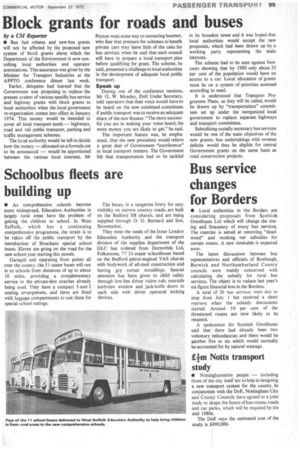Block grants for roads and buses
Page 95

If you've noticed an error in this article please click here to report it so we can fix it.
by a CM Reporter
• Bus fuel rebates and new-bus grants Will not be affected by the proposed new system of block grants about which the Department of the Environment is now consulting local authorities and operator associations. This assurance was given by the Minister for Transport Industries at the APPTO conference dinner last week.
Earlier, delegates had learned that the Government was proposing to replace the present system of various specific bus service and highway grants with block grants to local authorities when the local government re-organization comes into effect in January 1974. This money would be intended to cover all local transport needs — highways, road and rail public transport, parking and traffic management schemes.
The local authority would be left to decide how the money — allocated on a formula yet to be announced — would be apportioned between the various local interests. Mr Peyton went some way to reassuring busmen, who fear that pressure for schemes to benefit private cars may leave little of the cake for bus services when he said that each council will have to prepare a local transport plan before qualifying for grant. The scheme, he said, presented a challenge to local authorities in the development of adequate local public transport.
Speak up During one of the conference sessions, Mr G. W. Moseley, DoE Under Secretary, told operators that their voice would have to be heard on the new combined committees if public transport was to receive an adequate share of the new finance. "The more successful you are in making your voice heard, the more money you are likely to get," he said.
The important feature was, he emphasized, that the new procedure would relieve a great deal of Government "interference" in local transport matters. The Government felt that transportation had to be tackled in its broadest sense and it was hoped that local authorities would accept the new proposals, which had been drawn up by a working party representing the main interests.
The scheme had to be seen against forecasts showing that by 1980 only about 25 per cent of the population would have no access to a car. Local allocation of grants must be on a system of priorities assessed according to need.
It is understood that Transport Programme Plans, as they will be called, would be drawn up by "transportation" committees set up under the reorganized local government to replace separate highways and transport committees.
Subsidizing socially necessary bus services would be one of the main objectives of the new grants; bus undertakings with revenue deficits would thus be eligible for central Government grants on the same basis as road construction projects.
































































































































































































































































































































































































































































































































